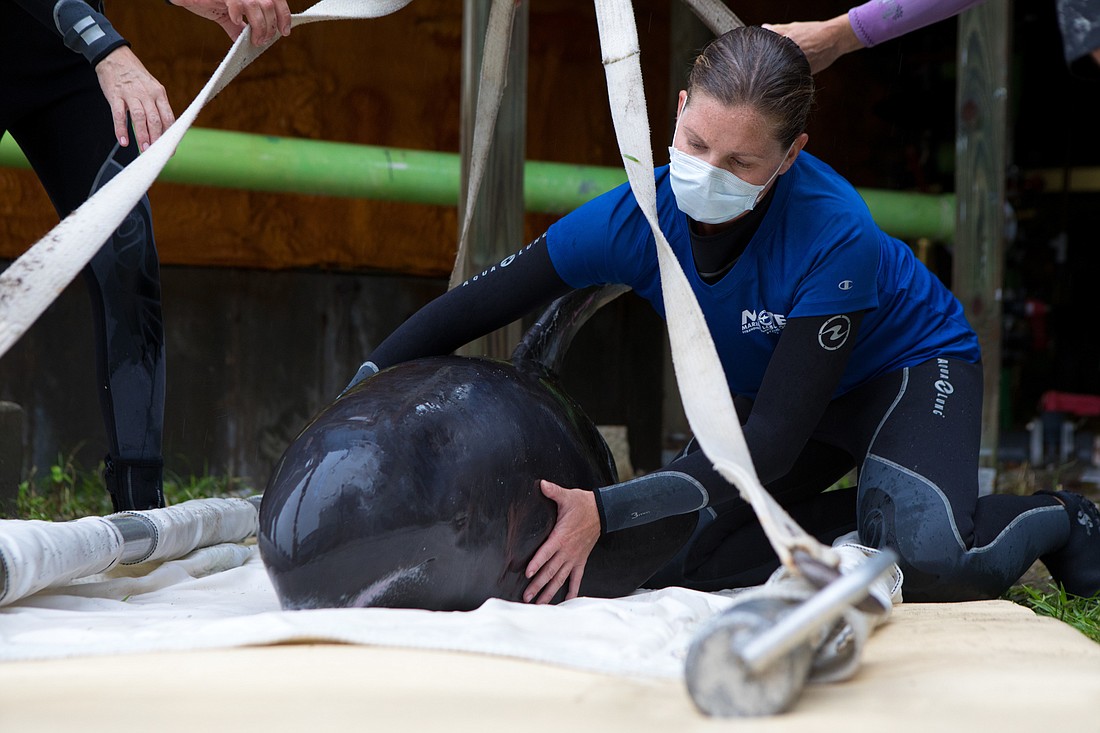- July 10, 2025
-
-
Loading

Loading

On Aug. 29, two stranded pygmy killer whales were rescued in Clearwater.
On Aug. 30, the two whales were moved to Mote Marine Laboratory by Clearwater Marine Aquarium rescuers with approval from NOAA Fisheries, which oversees the National Marine Mammal Stranding Network. The animals, nicknamed “Thunder” and “Lightning” because they arrived at Mote during a thunderstorm, are in critical condition, a statement from Mote said.
The reason the whales stranded is unknown, but as of the afternoon of Aug. 30, Thunder was able to swim unaided for periods of time, but Lighting needed frequent help by caregivers in the water, Mote’s statement said.
Fortunately, the whales have interacted with each other, which is a positive sign for this species. At this time, Mote’s statement said their prognosis is unclear and can change at any time.
Currently, Thunder and Lightning are being monitored and are receiving physical support as needed, fluid therapy and diagnostic tests.
“So far we are providing antibiotics, fluids and treatment for parasites, and we’re testing for other concerns that might affect this offshore species,” Gretchen Lovewell, Mote’s Stranding Investigations Program manager said in the statement.
Currently, the whales have shown no behavioral signs of exposure to red tide neurotoxins, which has been in the area since late July.
“We will take blood samples, and if possible, fecal samples to send to a lab that will test for red tide toxin exposure; the results will likely take weeks, as samples are being tested from many animals in many areas now,” Lovewell said in the statement.
Mote’s Stranding Investigations Program provides rapid response 24/7 to reports of stranded marine mammals and sea turtles in Sarasota and Manatee counties and other areas as needed within the NOAA network.
The stranding investigations program rescues animals found alive and recovers those that are dead to conduct necropsies, Mote’s statement said.
Thunder and Lighting are being cared for in Jane’s Refuge: The Hospital for Dolphins and Whales at Mote Marine Laboratory, which provides care to stranded dolphins and small whales with the mission of returning them to the wild, while also increasing knowledge about the species, Mote’s statement said.
Throughout August, Mote has recovered an unusually high amount of deceased animals that are suspected to have died from red tide exposure, however, Mote staff is conducting necropsies to learn more.
Mote’s statement said that critical care for one whale costs thousands of dollars a day. While emergency government aid is helping, Mote seeks community support for emergency issues, including the care of the whales, the monitoring of the recent red tide bloom and the spike in wildlife mortality. Anyone interested in supporting the efforts can visit mote.org/pages/help-mote-2018.
Updates on Thunder and Lightning will soon be available on Mote’s dolphin and whale patient page.